A guide to Yangon’s modern art galleries! Burma Pansodan & River gallery.
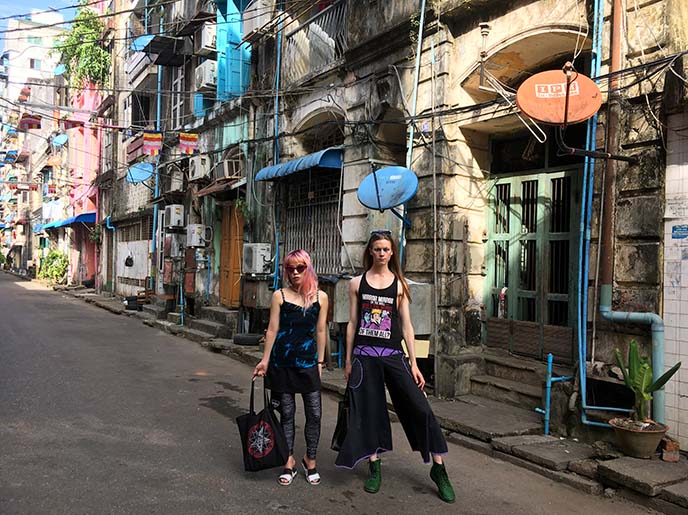
Let’s continue our Myanmar escapades… with a tour of the progressive art and photography galleries of Yangon!
Burmese artists are spreading their wings, now that they are free from military rule and censorship. With the support of these independent galleries, local creators are able to express themselves in ways that were previously forbidden (such as by painting nudes and political topics).
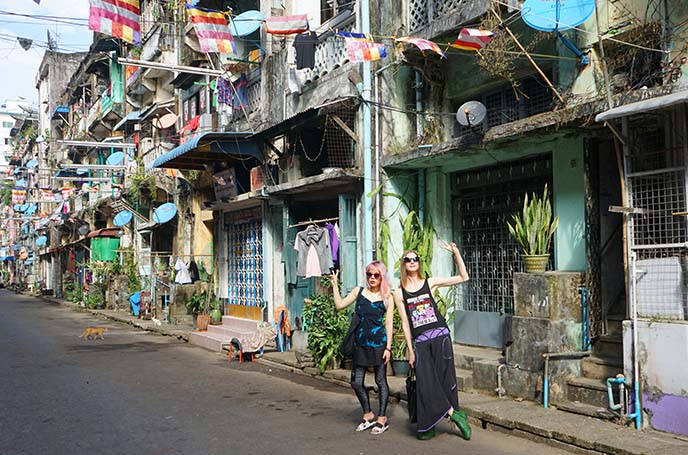
Yukiro and I are certainly “women who explore” — so let’s give you a tour of Yangon’s top galleries.
We stayed at ParkRoyal hotel, and they bestowed us with a car and driver that made getting from place to place much easier. I looked up a few Burmese art exhibits, and gave our driver the list. He figured out the most efficient route, which made it possible for us to see five venues that day: Pansodan, River, Nawaday Tharlar, New Zero, and Deitta.
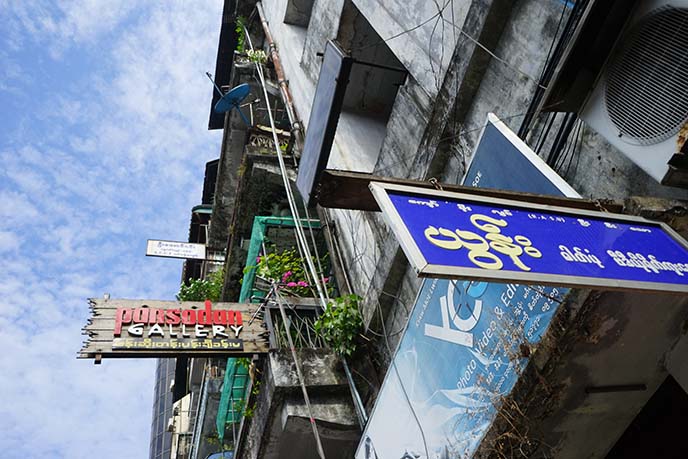
We started our art tour at Pansodan Gallery, which we heard was one of the best in the city.
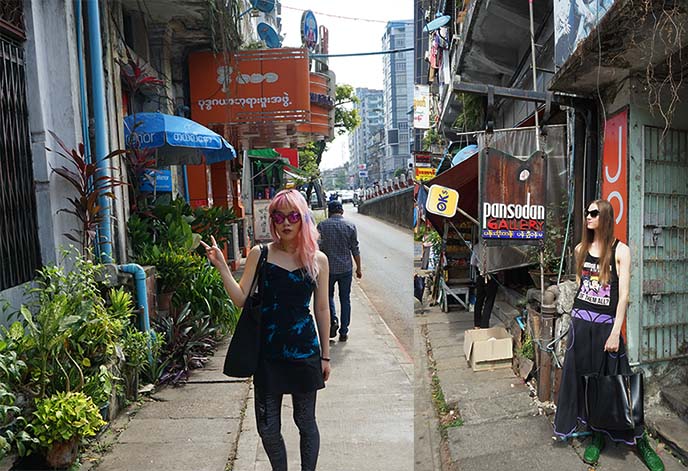
Love the greenery and vivid street signs near the entrance of Pansodan Gallery. Walk up the stairs, and you’re there.
Address: 1st Floor, 286, Pansodan Street, (Upper Block), Kyauktada Township, Yangon, Myanmar.
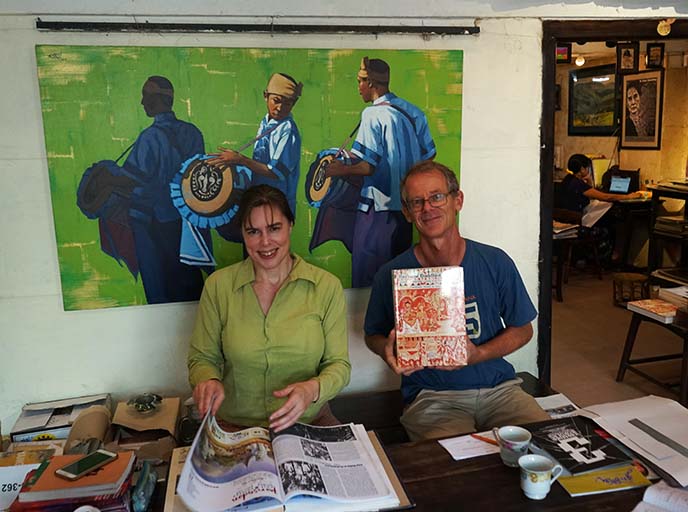
Pansodan Gallery was established in August 2008 by Aung Soe Min and Nance Cunningham, a Canadian who has lived in Burma since the 1990s.
We chatted with Nance and her French friend Christophe Munier, who recently published a book called Burmese Buddhist Murals. He told us that a lot of spiritual art from past centuries has been destroyed. His book attempts to document these works before they are gone, as preservation is unfortunately a challenge in a country with limited budget for the arts.
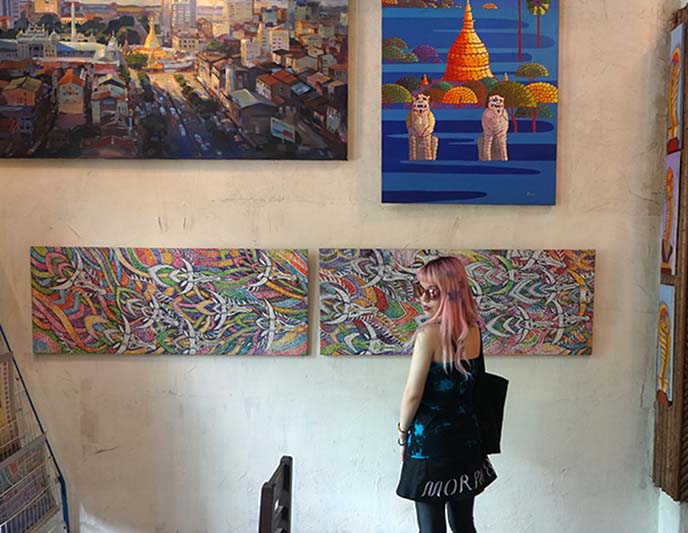
On the bright side, a gallery like Pansodan is a welcoming space, which gives Burmese artists a chance to present their works to worldwide audiences. The selection ranges from budding artists to older masters, working in a variety of mediums.
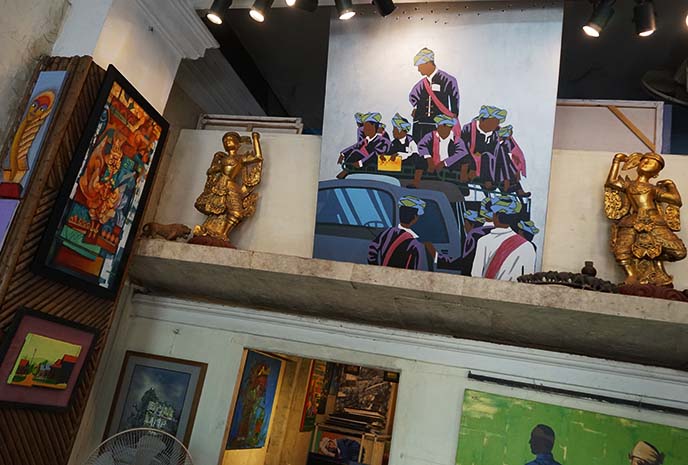
Pansodan Gallery also aims to make the local art accessible. Some of the paintings are in higher price ranges, but there’s a great selection of watercolors, cards, books and other small items for $10-30 US.
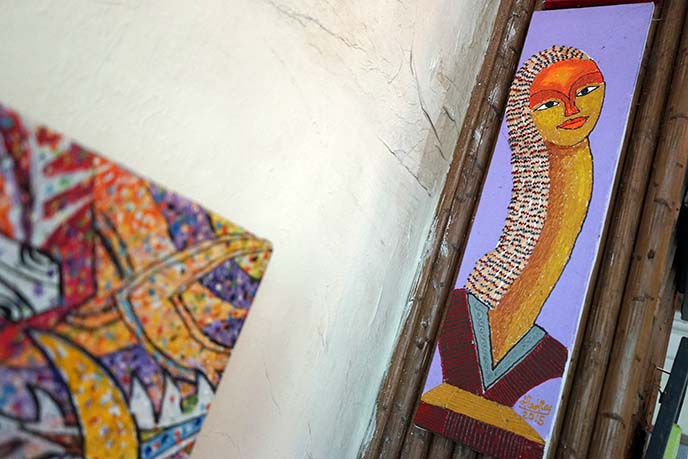
We loved seeing these fun, modern expressions of Burmese culture on the walls. Works like these were brimming with color and energy.
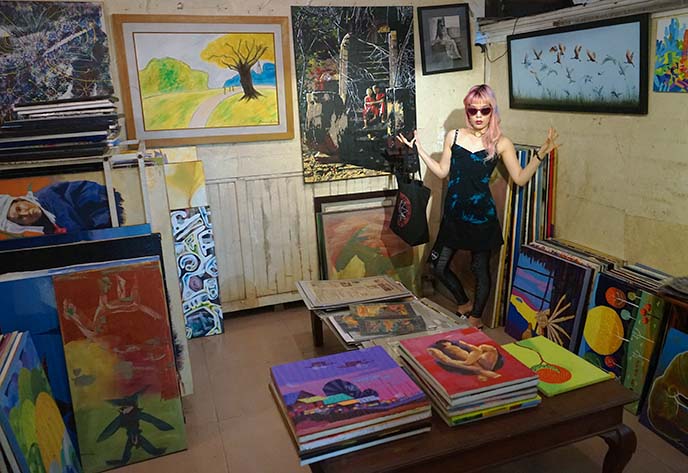
After years under the military government, Myanmar has opened up. In the past, only non-controversial, sanctioned subjects like landscapes were permitted. Now, artists are free to express any topics and themes without censure.
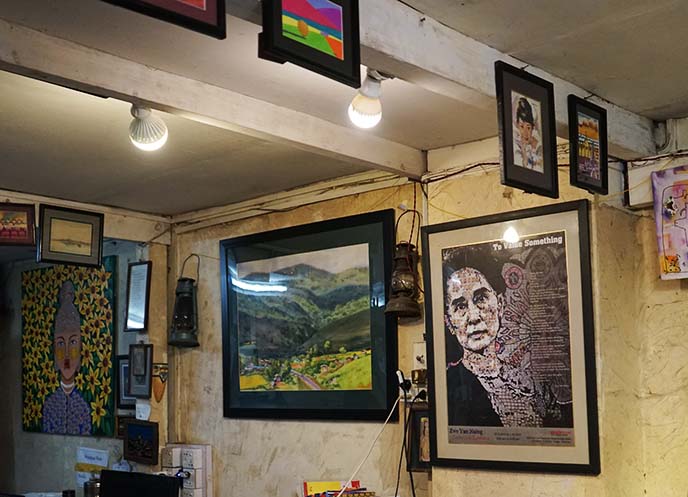
Before the current democratic government, it was difficult (to say the least!) to be an artist in Myanmar. Art supplies were often scarce, and if the military deemed your works to be offensive, they’d be confiscated. It was even forbidden to display photos and paintings of “The Lady,” Aung San Suu Kyi.
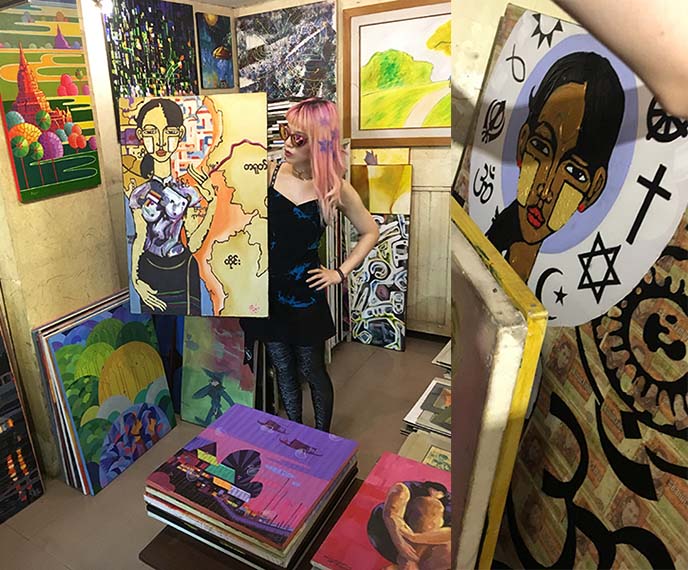
Now that she’s the leader of the democracy, the arts have flowered. This liberalisation has enabled artists to depict nudes, and political or edgy subjects for the first time. Many choose to paint Aung San Suu Kyi, as you can see in the examples above.
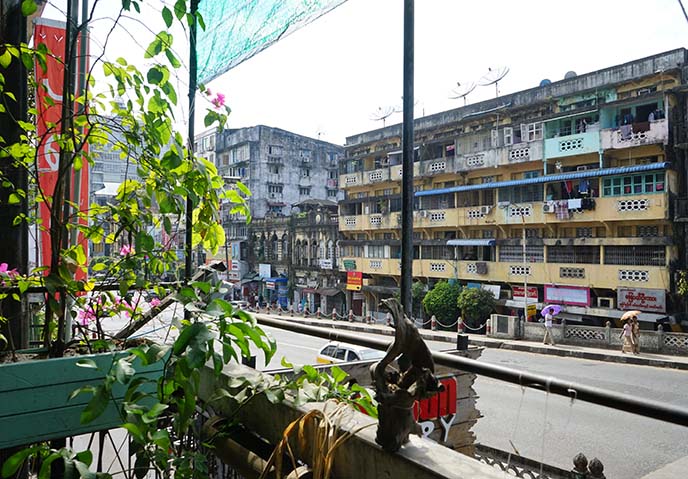
Pansodan Gallery encourages this creative renaissance in many ways, including running a laid-back social event every Tuesday night. Anyone can come to enjoy beer and snacks, talk art, and meet others.
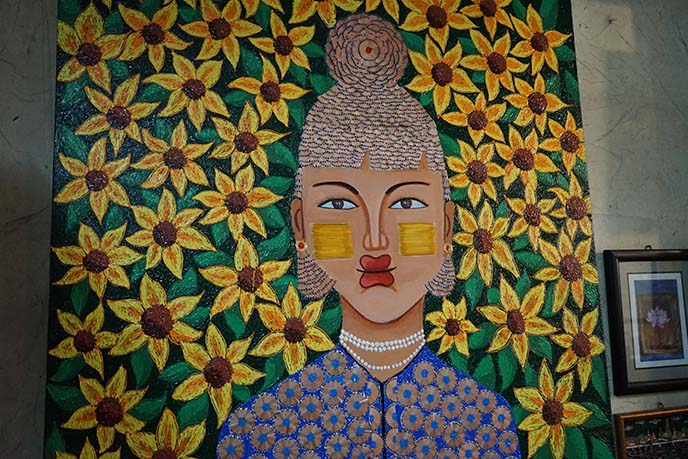
The owners have also opened up a new space called Pansodan Scene recently. In addition to displaying paintings, the Scene has poetry readings, talks, concerts, and a small cafe.
(Address: 144, 2nd Floor, Pansodan Street, Corner of Mahabandoola Street, Kyauktada Township, Yangon)
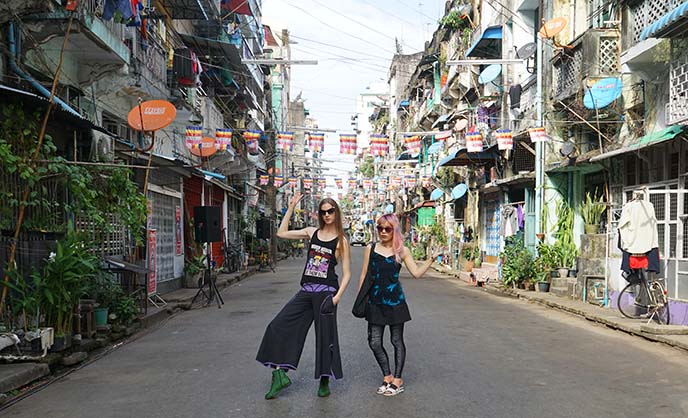
Yukiro and I consider the streets of Yangon to be works of art in themselves! So many colors and textures in a single block.
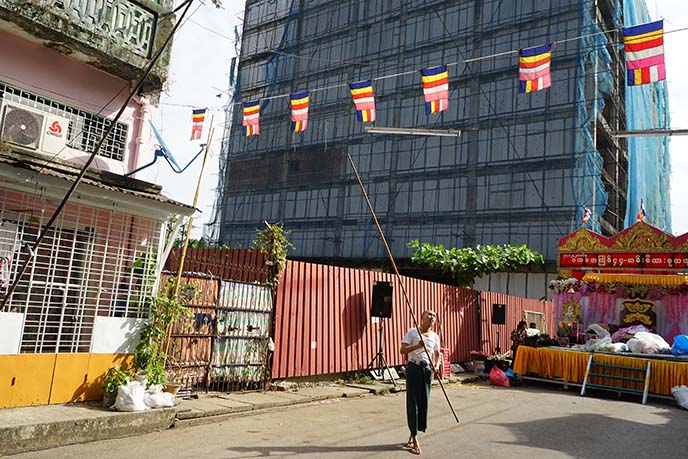
We watched this man hang up spiritual flags, as he prepared a stage for a Buddhist event.
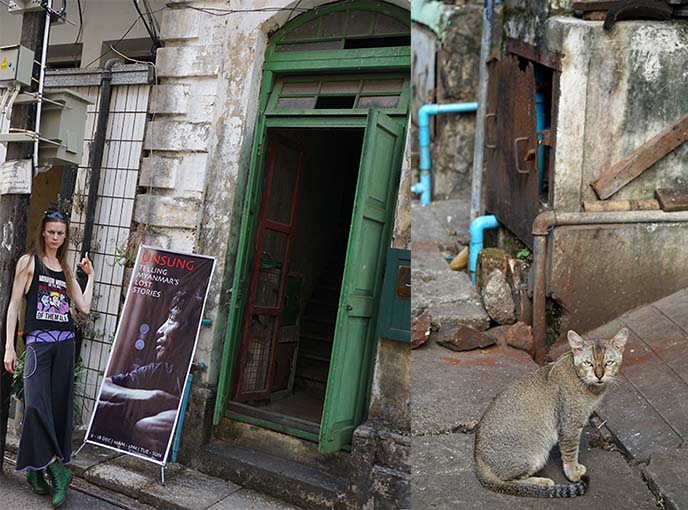
We said hello to a few cats, on the way to our next stop: Myanmar Deitta gallery. (Address: No.49, 44th St, Yangon, Burma).
This is a not-for-profit organisation that supports photographers, filmmakers and other multimedia producers in Myanmar. The upper level space hosts workshops and exhibitions, with the goal of presenting and discussing social issues that were formerly repressed by the military.

We caught the bilingual exhibit by The Kite Tales Project, titled “Unsung Heroes: Telling Myanmar’s Lost Stories.” Run by two journalists, Ma Thin Lei Win and Kelly Macnamara, this digital initiative captures the daily lives of people all throughout the country.
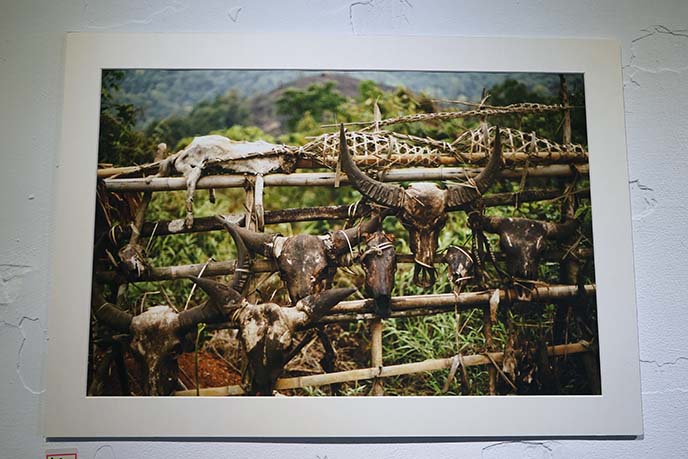
The journalists traveled all throughout Myanmar, including to remote and conflict regions. Through photo, video and audio, they recorded stories that had been silenced for decades, from a variety of perspectives.
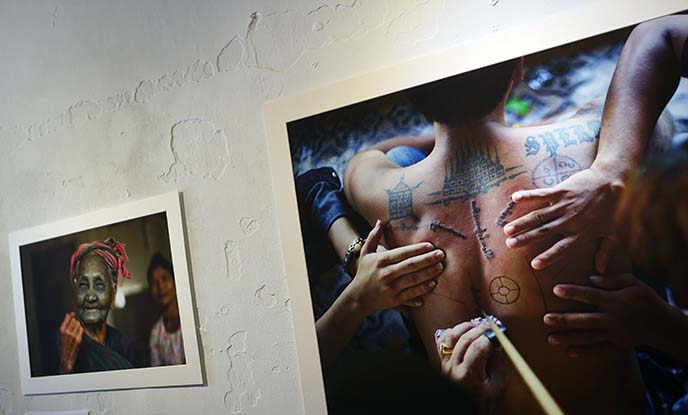
Naturally, I was drawn to these photographs of tribal tattoos and body modifications in Burma. On the left, a 90-year old woman from the ethnic Chin village sports a full-face blue tattoo. One of the reasons these women modify their appearance is to prevent other tribes from preying on them.
Another woman, a daughter of a Lahe chief, spoke about how her community once got tattoos to celebrate heroes and victories. She lamented that today the practice has become lost.
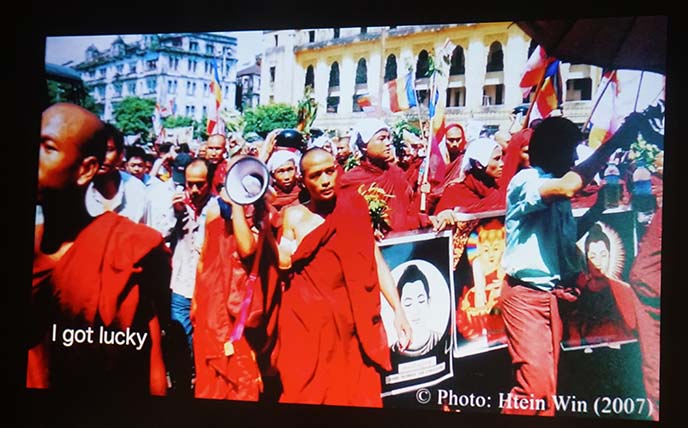
In the attic, we watched documentary footage from throughout the country. I was intrigued by these videos from the Saffron Revolution, a series of peaceful political demonstrations in 2007. Many Buddhist monks took part in this nonviolent resistance, wearing saffron-colored robes.
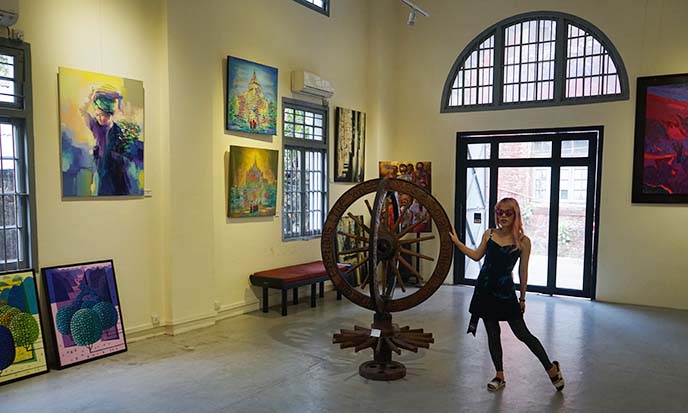
Onward to River Gallery, which was once housed in The Strand hotel. (Address: Chindwin Chambers 33/35, 37th and 38th Street, Yangon)
Yukiro opened his Pokemon Go app, and realized there were almost no Pokemon to catch in Myanmar. Nonetheless, this gallery had what looked like a wooden Poke-Stop sculpture, which you could even spin!

River Gallery is a high-ceilinged space that beautifully showcases the works of Myanmar’s leading contemporary artists. It’s a great place to pick up artistic souvenirs, as there are cups, jewelry and other fine items for sale.

Before the democratic leadership, Myanmar was isolated from the global art scene, and struggled under the draconian censorship. River Gallery was keen to create a space for local artists to get better representation and exposure.
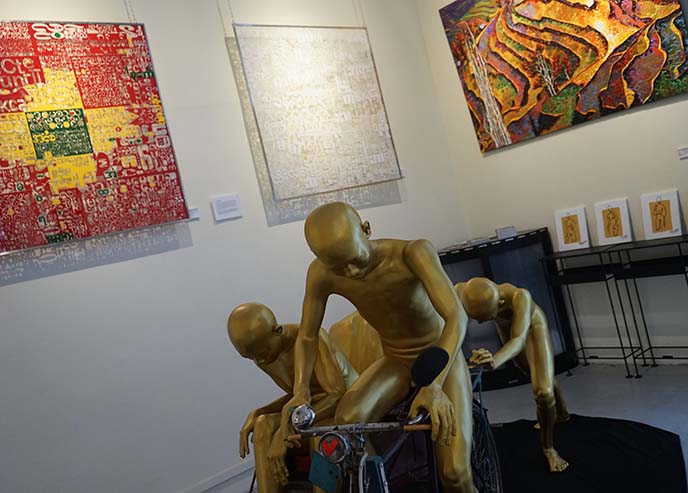
Here, you can see playful and abstract works by over 40 contemporary artists, who are now free from these restraints. River Gallery organises an annual show abroad for its talents as well.

In contrast, New Zero Art Space is a more obscure and underground gallery. We went into an apartment building, and searched for the door to this non-profit. (Address: No,202, 2nd Floor, United Condo, Ah Lan Pya Pagoda Road, Dagon Township Yangon 1181)

We stepped into “Identity of Fear: A Solo Exhibition by Mayco Naing.” The stark, white tiles of the space were the perfect backdrop to her black and white photographs.

The concept: young Burmese, immersed in baths, with their hands clasped over their faces. Naing’s photographs reflect the generation born around the 1988 Revolution. She and her fellow 20-30 year olds faced a volatile dictatorship, low educational standards and conservative values while growing up.

The underwater bathtub images represent the stifling educational opportunities she feels her peers have suffered. The nudity also confronts feelings of shame about the human body.
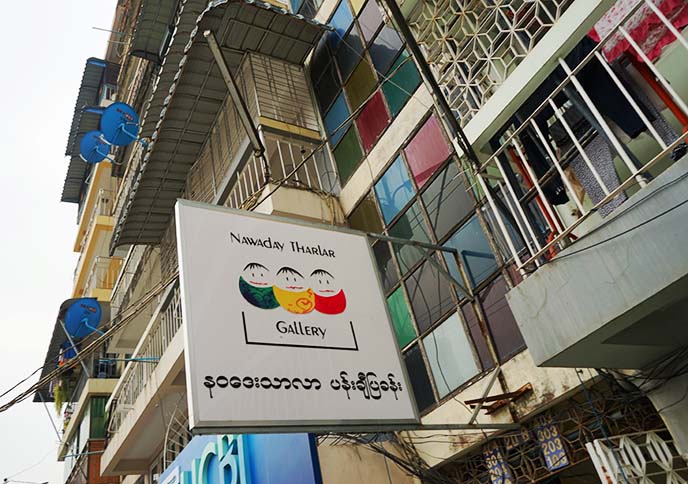
Before heading back to our ParkHotel, we stopped by the nearby Nawaday Tharlar gallery. The smiling kawaii logo is impossible to resist!
Address: Yaw Min Gyi road Building No. 20B Room No. 304, Yangon, Myanmar (Burma)
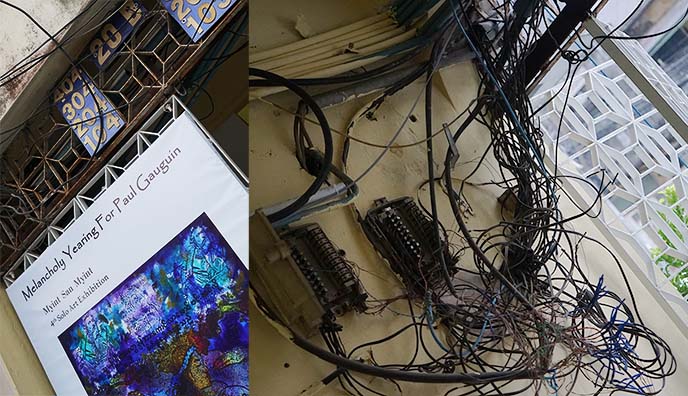
When we stepped into the entrance, we were mesmerised by the tangle of electrical wiring — that’s an art piece on its own!
Nawaday Tharlar opened in 2012, and is dedicated to creating a place for people to come together and share art, music, poetry and stories.

The gallery holds a bi-monthly open mic, where anyone can come to perform. It also hosts different creative activities, such as a tea and drawing workshop.

In the main room, we enjoyed the “Yangonoftheday One Year Exhibition.” This photography project posts images once a day, depicting some aspect of Yangon city life.

The concept shows all the facets of Yangon (Rangoon) and its people, and lets residents share their stories through Instagram-like square photos.

I spotted monks and punks. Birds and buildings.

In the back rooms, there are stacks upon stacks of canvases, from dozens of Burmese artists. Anyone can come to flip through them.

Buddhist themes abound, in this spiritual country. Isn’t the Burmese writing lovely?
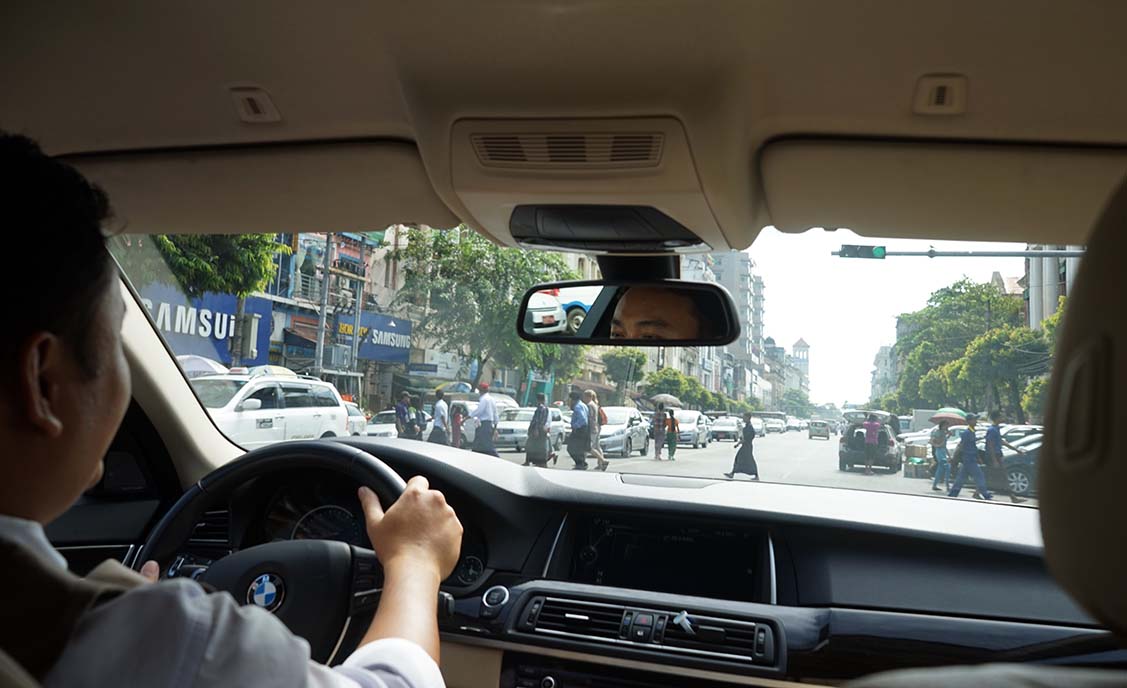
Props to our ParkRoyal hotel driver, for navigating these confusing and busy streets! Interestingly, motorcycles are banned in the city, so you won’t see street scenes similar to Vietnam. Still, people will cross the roads willy-nilly.

We saw children in school uniforms, and adults in matching longyi (the long Burmese tied skirts worn by men and women).

Our car passed by the Ganesh Hindu Temple. Buddhism is practised by about 88% of the population, but there are other religions here too.

As we drove through the narrow streets, our car windows were perfect for people-watching.

We noticed these covered drinking gourds, or pots of water that anyone can drink from.

Myanmar has a lot of investment from Korea and Japan, hence this street filled with technology stores. Smartphones are common here…
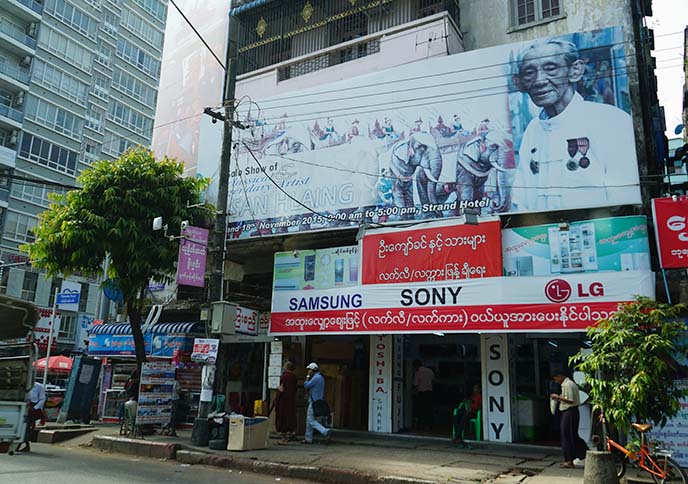
… as Samsung, Sony, LG and others have a large presence.

Modern and traditional are a true balance in Yangon. We’re very glad we came to Myanmar, and hope to see Bagan and more of the country next time.
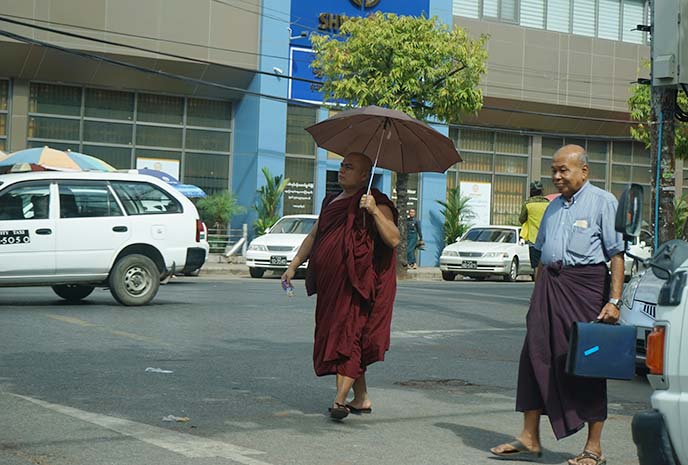
For more about Burmese Buddhism and monks, come see our story about the golden Shwedagon Pagoda.
Isn’t Myanmar a fascinating country? I’m glad to see the liberalisation of arts here, and look forward to these continued positive changes.
SHARE & COMMENT

 LA CARMINA
LA CARMINA







20 Comments
astonishing country.
I agree
Aung San Suu Kyi <333
<3
you 2 look so good!
xxxx
Breathtaking!
I<3 Yangon
^^
<3 <3
never been to myanmar, but i’d love to!
http://7-sevendays.blogspot.gr/
an inspiring place !
we love this direction for the blog.
si + lily
glad to hear!
monks and punks. Birds and buildings.<3
it’s the same really?? haha
Awesome!
it was lovely.
:D
Cheers!